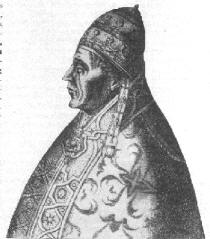 Alexander
V (also Peter of Candia or Peter
Philarges, ca. 1339 - May 3, 1410) was Pope
or Antipope during the Western Schism. He
reigned from June 26, 1409 to his death in 1410
and is now officially regarded by the Catholic
Church as an antipope.
Alexander
V (also Peter of Candia or Peter
Philarges, ca. 1339 - May 3, 1410) was Pope
or Antipope during the Western Schism. He
reigned from June 26, 1409 to his death in 1410
and is now officially regarded by the Catholic
Church as an antipope.He was born in Crete of unknown parents and entered the Franciscan order. His abilities were such that he was sent to study at the universities of Oxford and Paris. While he was in Paris the Western Schism (1378-1417) occurred; Philarges supported Urban VI. He settled in Lombardy, where, thanks to the favour of Giangaleazzo Visconti, the Duke of Milan, he became bishop, first of Piacenza (1386), then of Vicenza (1387), then of Novara (1389), and finally archbishop of Milan (1402).
On being created cardinal by Innocent VII in 1405, he devoted all his energies to the reunion of the Church, in spite of the two rival popes. He was one of the promoters of the Council of Pisa and his politicking incurred the displeasure of Gregory XII, who ordered Philarges deprived of both his archbishopric and his cardinalitial dignity.
At the Council of Pisa (from March 25, 1409) the assembled cardinals chose Philarges as the new prelate for a chair they presumed was vacant. He was crowned on June 26, 1409 making him in reality the third rival pontiff.
During his ten month reign, Alexander V's aim was to extend his obedience with the assistance of France, and, notably, of Duke Louis II of Anjou, upon whom he conferred the investiture of the Kingdom of Sicily, having removed it from Ladislas of Naples. He proclaimed and promised rather than effected a certain number of reforms: the abandonment of the rights of "spoils" and "procurations," and the re-establishment of the system of canonical election in the cathedral churches and principal monasteries. He also gave out papal favours with a lavish hand, from which the mendicant orders benefited especially.
Death came upon him suddenly while he was with Cardinal Baldassare Cossa at Bologna, on the night of 3 May-4 May 1410. His remains were placed in the church of St. Francis at Bologna. A rumour spread that he had been poisoned by Cossa, who did succeed him as John XXIII. Whether Alexander V was a pope or an antipope is still a matter of debate, although he is not listed by the Vatican as a pope.

